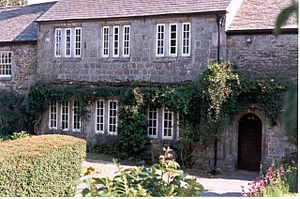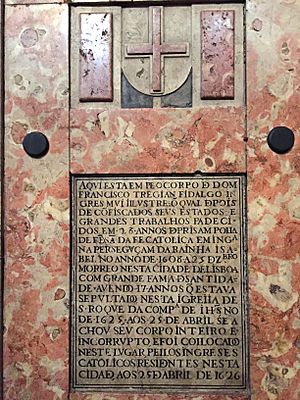Francis Tregian the Elder facts for kids
Francis Tregian the Elder (born 1548, died 1608) was a wealthy landowner from Cornwall, England. He was a recusant, which means he was a Catholic who refused to attend the services of the Church of England. Because of his beliefs, he was arrested and spent many years in prison. Later, he was pardoned by the King.
Early Life and Beliefs
Francis Tregian was the son of John Tregian and Catherine Arundell. His family lived in Probus, Cornwall. When his father passed away, Francis inherited a lot of land and the family home called 'Golden', near Truro.
Francis was a very strong Catholic. During his time, England was mostly Protestant, and Catholics faced difficulties. He even lived at the English Court for a while to try and help other Catholics who were being treated unfairly.
In 1576, Francis Tregian secretly welcomed a Catholic priest named Cuthbert Mayne into his home. Mayne pretended to be Tregian's steward, which is like a manager of the household.
Arrest and Trial
On June 8, 1577, the local sheriff, Richard Grenville, surrounded Golden Manor House with about a hundred men. They arrested both Francis Tregian and Cuthbert Mayne.
Their trial took place in Launceston, Cornwall on September 16, 1577. Francis Tregian was accused of breaking a law called the Statute of Praemunire. This law made it illegal to spread official messages or orders from the Pope. Cuthbert Mayne had a special paper from the Pope, and it was believed he planned to give it to Tregian.
Francis Tregian was held in a prison called the Marshalsea for ten months before his trial. At first, the jury didn't want to find him guilty. But after the judges pressured them, they eventually convicted him.
Years in Prison
Instead of a death sentence, Francis Tregian was sent to prison, and his property was taken away. He spent 28 years in different prisons, including Windsor and various prisons in London. His wife even joined him in Fleet Prison for a time.
This period showed how difficult it was for Catholics in England. Government officials often used the law to punish Catholics.
One famous Catholic who was executed during this time was Edmund Campion in 1581. Francis Tregian was in prison when this happened. He had a close friend named Thomas Pounde, who was also a Catholic and was imprisoned with Campion. Pounde even wrote a long poem that was probably dedicated to Tregian, talking about the struggles of Catholics.
Later Life and Legacy
In 1601, after many years, King James I finally released Francis Tregian. In 1603, Tregian left England. He moved to Madrid, Spain, where King Philip III of Spain gave him a pension, which is like a regular payment.
Francis Tregian passed away in Lisbon, Portugal, on December 25, 1608. He was buried at the Jesuit church of Igreja de São Roque. Seventeen years later, his body was found to be well-preserved. English Catholics living in Lisbon then reburied him in a special tomb in the same church.
The inscription on his tomb says that he suffered greatly for 28 years in prison for defending his Catholic faith during the time of Queen Elizabeth. It also says he died with a great reputation for being a very holy person.
Biographies
- P. A. Boyan and G. R. Lamb, Francis Tregian, Cornish Recusant (London and New York, 1955)
- Raymond Francis Trudgian, Francis Tregian, 1548-1608: Elizabethan recusant, a truly Catholic Cornishman (Brighton and Portland, 1998)
- Francis Plunkett, Life of Francis Tregian. Written in the seventeenth century by Francis Plunkett, Cistercian monk. In: Catholic Record Society (Great Britain) vol. 32 (1932) p. 1-44. Each section of Latin text followed by English translation.
 | William Lucy |
 | Charles Hayes |
 | Cleveland Robinson |



